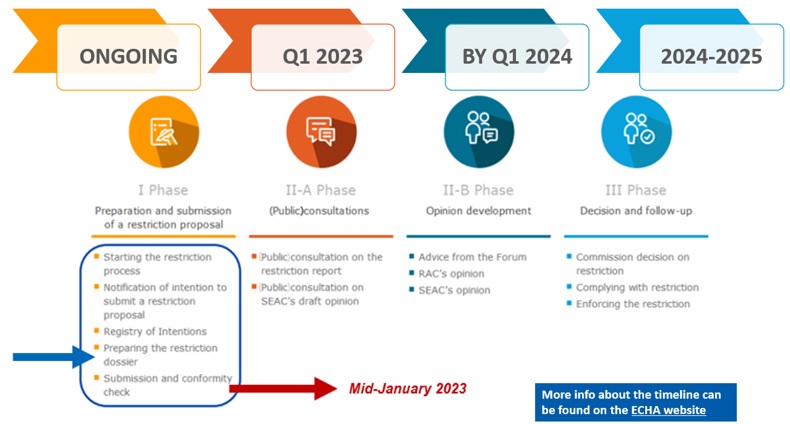Update on the PFAS restriction process

Following the submission to the European Chemicals Agency (ECHA) of the proposal for a REACH restriction of PFAS, the tentative timing of the restriction process has been published on the ECHA website. The proposal will now be analysed by the ECHA scientific committees to conclude whether the proposed restriction meets the legal requirements of REACH. EFCTC has contributed with extensive information to the two calls for evidence to collect information on the PFAS substances included in the restriction scope definition. EFCTC explained that F-gases have unique physical, chemical and (eco)toxicological properties compared to other PFAS and that their emissions are already successfully controlled under the F-gas Regulation, with additional emission control measures anticipated for the revised Regulation.
ECHA run the required administrative checks before the proposed restriction and supporting documents were made available on 7 February 2023. On the same day, the national authorities hosted a hybrid media event in Brussels from 11:00 to 12:30 (CET). ECHA’s scientific committees for Risk Assessment (RAC) and for Socio-Economic Analysis (SEAC) will check that the proposed restriction meets the legal requirements of REACH in their meetings in March 2023. If it does pass, the committees will begin their scientific evaluation of the proposal. A six-month consultation is planned to start on 22 March 2023. An online information session will be organised by ECHA on 5 April 2023 to explain the restriction process and help those interested in participating in the consultation.
The opinions of RAC and SEAC are normally ready within 12 months from the start of the scientific evaluation, in accordance with REACH. However, in view of the complexity of the proposal and the extent of information that is expected from the consultation, the committees may need more time to finalise their opinions. Once the opinions are adopted, they are sent to the European Commission, who, together with the EU Member States, will then decide on a potential restriction.